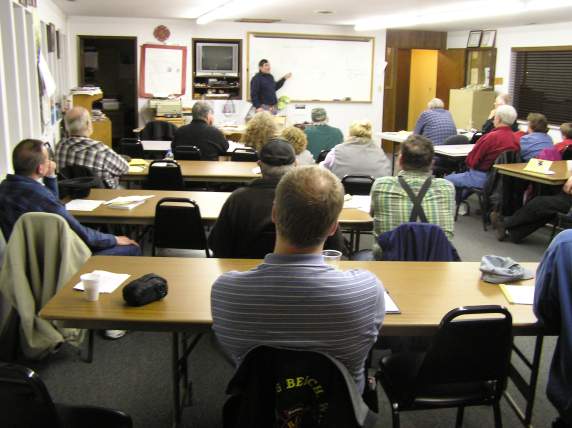Pacific County Amateur Radio Club Training Program
The Pacific County Amateur Radio Club is committed to helping anyone interested in Amateur Radio to enter, or advance within the hobby. Based upon interest, the club holds classes and Volunteer Exam sessions to train and license Amateur Radio operators. If you would like to join one of our classes, or would like help studying on your own, please contact us. We would be happy to help.
|
Winter Seminar Series |
License Preparation Classes
| Start Date | End Date | Class | Address | Start/End Time | Cost | Contact |
|---|---|---|---|---|---|---|
| To Be Determined | To Be Determined | Technician |
10:00AM/4:00PM |
Free | ||
| To Be Determined | To Be Determined | General Upgrade |
10:00AM/4:00PM |
Free |
Email
Frank, [email protected]
if you have
an interest in
a class, an exam, or help studying for
a license or upgrade on your own!
Classes are driven by demand!
The
Winter Seminar Series
is presented in answer to demand. Requests
for specific presentations will be considered. Check back often
for updates and schedule changes.
Further classes, both for entry
into, and upgrading
within Amateur Radio are
put together as dictated
by demand. If you have a
group of six or more
in Pacific County, WA,
who would like to
take a class, we are interested
in hearing from you!
Click here to email Frank, [email protected]. We encourage the newcomer to the hobby
and the "old salt" alike, to come and learn. There
is no cost for our classes
(the recommended text
for License Preparation Classes
costs about $20 and there
is a fee for the exam).
Please
email
Our last Introductory Technician class
was held in Tokeland.
Our classes are generally held
on two days, a week apart (usually
Saturdays or Sundays) from 10:00 AM
to 4:00 PM.
The required FCC License
Examination is offered during
the second day of class
for the convenience of our students,
although usually anyone may take an exam at our
sessions.
If you, or someone you know,
has an interest in
taking one of our classes, or
an FCC Amateur licensing exam,
please contact the instructor.
Click here to email Frank, [email protected].

